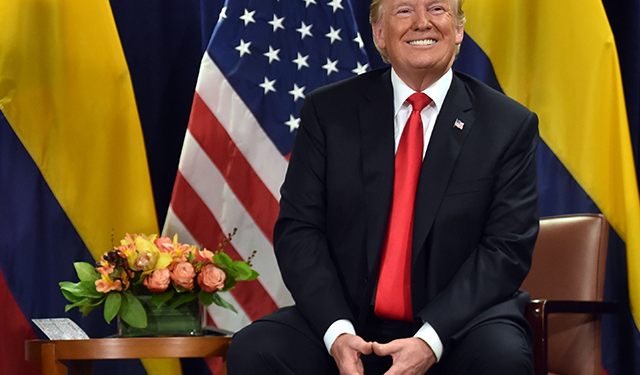President Donald Trump once again showcased his signature style of deal-making with a bold tariff threat against Colombia—one that quickly turned the tide in America’s favor. By announcing a 25% tariff on Colombian imports, with the potential to escalate to 50%, Trump forced Colombian President Gustavo Petro to reverse his stance and agree to accept deported migrants. What initially seemed like a diplomatic standoff quickly turned into a lesson in economic leverage, proving that the U.S. holds the upper hand when it chooses to flex its muscle.
Critics of Trump’s approach warned of a looming economic disaster, with fears of skyrocketing flower prices ahead of Valentine’s Day and a coffee supply crisis. Yet, in reality, the Colombian government folded almost immediately, underscoring the stark economic imbalance between the two nations and demonstrating the effectiveness of Trump’s tough stance.
America’s Economic Leverage: The Numbers Speak
To understand why Colombia had little choice but to comply, just look at the trade figures. In 2023, the U.S. imported $16.1 billion worth of Colombian goods, making up 28% of Colombia’s total exports and 5.6% of its GDP. By contrast, U.S. exports to Colombia were $17.7 billion—just 0.07% of America’s massive $26.9 trillion economy.
Simply put, Colombia is economically dependent on U.S. demand, while a trade dispute with Colombia would barely register in the broader American economy.
Take the Colombian flower industry as an example—80% of the cut flowers sold in the U.S. come from Colombia, and Valentine’s Day alone accounts for a huge portion of annual sales. Trump’s tariff threat, strategically timed just before this peak season, made the pressure unbearable for Colombian exporters. A trade war could have crushed key industries in Colombia, causing widespread economic hardship, while for the U.S., it would have been little more than an inconvenience.
Petro’s Quick Reversal: A Lesson in Realpolitik
Initially, Petro tried to frame the dispute as a matter of Colombian sovereignty, pushing back against Trump’s demands. However, economic realities hit fast. Within hours, his government conceded, agreeing to accept deportation flights on Trump’s terms. This wasn’t a slow, drawn-out negotiation—it was a clear-cut victory driven by the sheer force of economic power.
Trump’s move didn’t just resolve a short-term issue; it sent a powerful message globally. His use of tariffs as a political tool reinforced a key principle: access to the U.S. market is not a right, but a privilege—one that comes with responsibilities. Countries that rely on American trade would be wise to take note: under Trump’s leadership, economic pressure is not just a bargaining chip, but a game-changer.
A Win for U.S. Sovereignty and Border Security
Beyond trade, this move was about something bigger—American sovereignty. Trump made it clear that the U.S. will not allow foreign governments to dictate its immigration policies. The Biden administration had faced pushback from local school boards and parents over controversial materials in schools, leading to a broader debate about federal overreach. Similarly, this standoff with Colombia reinforced the idea that the U.S. will set its own policies, without interference.
For Petro, the reversal was an embarrassing but necessary course correction. For Trump, it was a textbook example of how strategic pressure can lead to quick results. By leveraging America’s economic strength, Trump didn’t just get his way—he reinforced the notion that when the U.S. acts with clarity and confidence, its power is both undeniable and unshakable.
In the end, the choice for Colombia was simple: economic devastation or compliance. They chose wisely. For America, this was yet another reminder that decisive leadership backed by economic strength remains an unbeatable formula.





















Thanks for sharing. I read many of your blog posts, cool, your blog is very good.
Thank you for your sharing. I am worried that I lack creative ideas. It is your article that makes me full of hope. Thank you. But, I have a question, can you help me? https://www.binance.info/ar/register-person?ref=V2H9AFPY